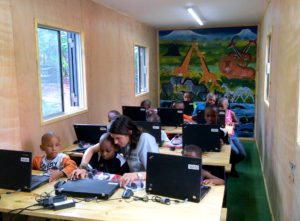 In sub-Saharan Africa, more than 182 million adults are illiterate, and 30 percent of young people are unable to read or write. Access to information and communication technology is critical to improving their educational and economic prospects. However, high equipment costs, poor infrastructure and limited proficiency all prevent technological resources from reaching those in need.
In sub-Saharan Africa, more than 182 million adults are illiterate, and 30 percent of young people are unable to read or write. Access to information and communication technology is critical to improving their educational and economic prospects. However, high equipment costs, poor infrastructure and limited proficiency all prevent technological resources from reaching those in need.
Enter the Arrow Electronics DigiTruck.
A 40-foot steel cargo container converted into a fully equipped mobile computer lab, the DigiTruck is equipped with solar panels capable of powering it for several days at a time, so it can reach remote rural villages with no electricity. It is also triple-insulated to protect against the crushing desert heat.
In addition to financing the DigiTruck’s construction, Arrow donated all of the equipment inside, including laptops, tablets, printers, routers and an LED TV flat-screen monitor. The devices were recovered, refurbished and donated through Arrow’s IT asset disposition program.
I was fortunate to be on the ground when we deployed the first Arrow DigiTruck to Tanzania’s Tuleeni Orphans Home in August of 2015. Operated by Neema International, the orphanage is home to around 80 children who have lost their parents, mostly to AIDS. Yes, they need the basics — shelter, food, clothing and clean water. But they also need to become the innovators of their own future if they are going to live longer, better lives. And, the only way they will get there is by using computers — to learn, to connect, to collaborate with people who live beyond walking distance.
As one of the world’s largest refurbishers of electronics, Arrow plays an important role in the e-waste ecosystem; last year alone, our value recovery business helped to keep around 50 million metric tons of e-waste out of landfills and villages, not unlike the one where Tuleeni is located.
We also work with companies all over the world to securely refurbish their old computers, tablets, smartphones and other electronic devices and to repurpose still-valuable component parts for a second life. Whenever possible, Arrow works to extend the life of these devices by redeploying them back within organizations or by donating them to places like Tuleeni.
For a decade, Arrow worked hand in hand with the Brussels-based nonprofit group Close the Gap to facilitate the donation of about 500,000 refurbished computers to schools and clinics in Africa, where they’re used by 1.5 million people. That’s obviously a big number, but it turns out we were only addressing part of the issue, because more than 600 million people in Africa live off the grid.
So we upped the ante in 2015, partnering with Close the Gap to build the solar-powered DigiTruck and to bring the technology — and the electricity required to power it — to even more people.
Creative and sustainable initiatives like the DigiTruck are just one way that Arrow gives back. As electronics recycling and refurbishment experts, we can all play a part in helping to close the digital divide — just one refurbished computer can make a difference in a child’s life.
Mandy Stein, the young dynamo who runs the Tuleeni Orphans Home, put it best when she said, “My kids’ worlds have been completely changed with the computers and the DigiTruck — their dreams are now within reach.”
Dream big kids. Dream big.
Joe Verrengia is the global director of corporate social responsibility at Arrow Electronics.

The views and opinions expressed are those of the author and do not imply endorsement by Resource Recycling, Inc. If you have a subject you wish to cover in an op-ed, please send a short proposal to [email protected] for consideration.


